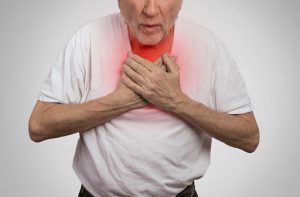 Adults affected by the chronic obstructive pulmonary disease (COPD) are more likely to have an anxiety disorder problem, compared to those without the lung and breathing problem. The researchers found that COPD adults have triple the risk of developing a generalized anxiety disorder, compared to those without COPD.
Adults affected by the chronic obstructive pulmonary disease (COPD) are more likely to have an anxiety disorder problem, compared to those without the lung and breathing problem. The researchers found that COPD adults have triple the risk of developing a generalized anxiety disorder, compared to those without COPD.
The investigators pointed out that sleep problems, chronic pain, and functional limitations help to explain some of the added risk for anxiety disorders. Study author, professor Esme Fuller-Thomson said, “Even after accounting for 18 possible risk factors for GAD [generalized anxiety disorder], individuals with COPD still had 70 percent higher odds of GAD, compared to those without COPD.”
Advertisement
The study looked at a representative sample of 11,163 Canadians over the age of 50. Over 700 of them reported being diagnosed with COPD by a health care professional.
The study also looked at predictors of generalized anxiety disorders, specifically among those with COPD. Key risk factors for generalized anxiety disorders in COPD are lack of social support and exposure to parental violence during the older adults’ childhood. Older adults who do not have someone to confide in and guide them during important decisions are seven times more likely to develop an anxiety disorder, compared to those who do.
Co-author Ashley Lacombe-Duncan added, “Our findings suggest that screening for anxiety may be particularly important for patients who lack a strong social network. Individuals with COPD may be prone to social isolation, particularly if they also experience functional limitations that impair mobility.”
Older adults with COPD who were exposed to domestic violence in the childhood on more than 10 occasions are five times more likely to develop a generalized anxiety disorder. Lacombe-Duncan noted, “The chronic chaotic and violent home environment may have predisposed individuals to anxiety. Further research is needed to understand the pathways through which witnessing chronic parental domestic violence during the respondent’s childhood may increase the prevalence of anxiety disorders among older adults with COPD.”
Dr. Fuller-Thomas explained, “[The study] highlights how healthcare providers can play a significant role in identifying and providing promising interventions to reduce anxiety for individuals with COPD, in particular by screening for and addressing pain and functional limitations and targeting those most at risk.”
Manage anxiety symptoms in COPD
Anxiety in COPD can worsen the breathing and lung condition as it can create a viscous cycle of breathlessness. Feeling breathless can provoke feelings of panic, which can contribute to further breathlessness, and so on and so forth. In this situation, distinguishing between anxiety symptoms and those of COPD can be difficult.
Advertisement
Typical anti-anxiety medication can lead to decreased rates of breathing, which can worsen COPD symptoms, and so these may often not be prescribed to treat anxiety in COPD patients as it can worsen one problem while attempting to fix the other.
There are some forms of anti-anxiety medication like buspirone that don’t interfere with breathing and is also non-addictive. Some antidepressants, too, can benefit those with anxiety, so working with your doctor can help you determine which mode of treatment is best.
For optimal results, it’s best to pair medications with other treatment options to reduce anxiety, like counseling or therapy and breathing exercises. By combining lifestyle habits with medical aides you can achieve greater success in overcoming your anxiety with COPD in order to prevent complications associated with either condition.
